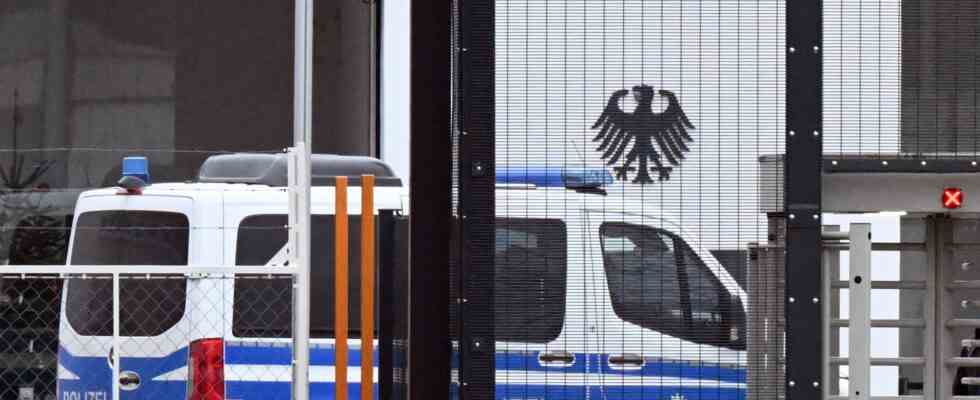FAQ
Status: 09.12.2022 8:38 p.m
At least 52 suspects, 23 of them in custody: After the major anti-terrorist operation, it is now a matter of evaluating the evidence and eventually bringing charges. What is the charge? What’s next?
What are the criminal charges against the accused?
The Federal Public Prosecutor’s Office is the federal public prosecutor’s office. She investigates on suspicion of “membership in a terrorist organization” (Section 129a of the Criminal Code) and partly also on suspicion of “supporting a terrorist organization”.
The investigators assume that the arrested suspects belong to a terrorist organization founded by November 2021 at the latest. This has set itself the goal of overcoming the existing state system in Germany and replacing it with its own form of government. The members of the association were aware that this project could only be realized through the use of military means and violence against representatives. This also includes the commission of homicides. Individual members are said to have made concrete preparations to force their way into the German Bundestag with an armed group.
Why aren’t all the accused in custody?
Not every suspect in a criminal investigation is automatically arrested. The sole purpose of pre-trial detention is to secure the criminal proceedings – i.e. to ensure that the accused do not escape later court proceedings and that no evidence is destroyed or manipulated until then. The pre-trial detention is not an early punishment, the accused are considered innocent until a final verdict. That is why there are high legal hurdles for pre-trial detention.
Prerequisite number one is “strong suspicion” – that’s a pretty high level of suspicion. There must be a high probability that the accused will be convicted in later criminal proceedings.
But because pre-trial detention is not an early punishment, that alone is not enough. Prerequisite number two is a so-called reason for detention. If there is a risk that the accused will evade criminal proceedings, for example by going abroad, the reason for detention is “risk of absconding”. If there is a risk that evidence will be destroyed, suspects collude or manipulate witnesses, the reason for detention is “risk of collusion”. The risk of recurrence is also a reason for imprisonment for certain crimes.
According to the law, no special reason for detention is required for some serious crimes (including suspicion under Section 129a of the Criminal Code). However, the Federal Constitutional Court has made it clear that this exception violates the principle of proportionality. Therefore, the law is to be interpreted here in such a way that there must be a reason for detention even in the case of serious crimes: the requirements for the examination are not quite as high, however. However, if it can be ruled out that there is a risk of escaping, collusion or repetition, pre-trial detention may not be ordered.
Could other suspects come into custody later?
For the investigators, it is now a matter of evaluating the evidence confiscated during the searches. Depending on the evidence, it is then possible that other suspects will be taken into custody. However, it is also possible the other way round that allegations against detainees are not confirmed or that the reason for detention disappears at some point. Then the accused could also be released from custody. Neither is a statement about their guilt. That will only be resolved in court.
Why were those arrested taken to Karlsruhe?
After an arrest, the law requires that the arrested person be brought before a judge by the end of the following day. If the federal prosecutor’s office leads the investigation, the investigating judge of the Federal Court of Justice is responsible – and he is based in Karlsruhe. In the specific case, the investigating judge – at the request of the Federal Public Prosecutor’s Office – had issued arrest warrants before the arrests were made. When the accused are presented, he must then check whether the conditions for pre-trial detention are still met. The accused can also comment on the allegations.
The investigating judge ordered 23 of the people arrested on the basis of the arrest warrants. According to the Federal Prosecutor’s Office, extradition proceedings are underway for the two suspects arrested in Austria and Italy.
How long can pre-trial detention last?
If the suspect is in custody, the so-called acceleration principle applies. That means it has to be done very quickly. Detention may therefore only last longer than six months if the investigations are particularly complicated, for example. That is certainly the case in terrorism proceedings. Especially when there are many suspects and a large amount of evidence has to be evaluated. Nevertheless, the investigations in these proceedings must also be brought to a conclusion as quickly as possible.
Accused persons can have it checked whether pre-trial detention is still appropriate and whether the principle of expeditiousness is being observed. If it turns out at the so-called detention review date that the investigations are not being conducted with the required speed, pre-trial detention would no longer be justified.
How does the case go to court?
When the federal prosecutor’s office has evaluated the evidence and pursued possible further approaches, it is a matter of filing charges. The prerequisite for this is that each accused has “reasonable suspicion” that he or she was a member of or supported a terrorist organization. According to the records, a conviction in court must be likely.
It could take months for an indictment to be finalised. The competent court would then have to admit the indictment and open the main proceedings. Only then does the process in the courtroom begin, in which the question of guilt is clarified.
A state protection senate at a higher regional court would be responsible. It is not yet clear which higher regional court that would be, because the accused come from all over Germany. The question of which courtroom such a process with such high security requirements could take place in the first place is also likely to pose challenges for the judiciary.


